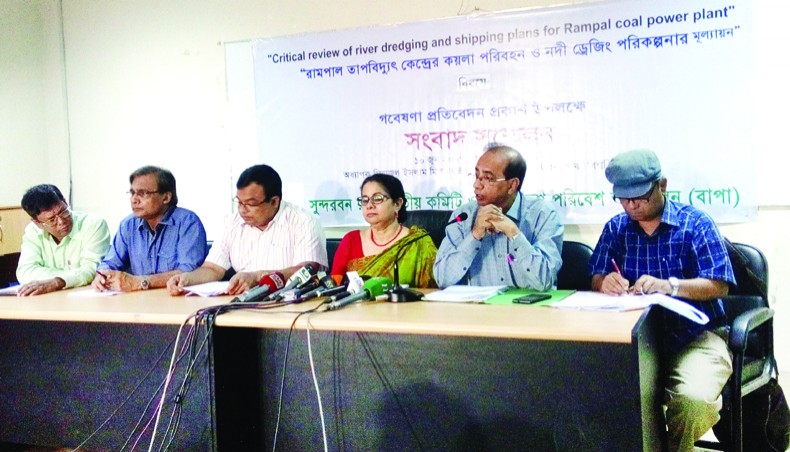
National Committee to Protect Sunderbans and Bangladesh Poribesh Andolon jointly hold a press conference at a Dhaka University auditorium on Saturday, marking unveiling of a report on Rampal power plant. — New Age photo
Dredging the Passur River and its channels to facilitate coal supplies to the Rampal coal-fired power plant would adversely affect the Sunderbans’ aquatic biodiversity, cautioned two reputed aquatic environmentalists of the US and Australia.
In their joint review reports, professor William Kleindl of the University of Montana, USA and professor Jon Brodie of the James Cook University, Australia, said that dredge spoil and sediment plumes would affect growth and survival of bottom-dwelling organisms, dolphins, fish and water birds.
According to their recent assessments dredging would disrupt natural sediment concentration in the near-shore ecosystem.
They came to the conclusion after reviewing the government’s five environmental impact assessment and feasibility studies on the project.
According to government documents, over 33 million tonnes of dredge spoil and sediment plumes would be removed from the Passur River and its channels to widen them for better navigability for supplying coal to the Rampal power plant.
They warned that dredging and sediment disposal would increase turbidity and affect availability of light for marine organism.
They found that the government had not sufficiently assessed the threats from dredging or made threat mitigating plans while the assessments lacked specification on the possible dumping zone and potential impacts of dredge spoil.
Their report was read out at a news conference organized by the National Committee to Protect the Sunderbans and Bangladesh Paribesh Andolon.
Bangladesh Agricultural University’s farm structure and environmental engineering professor Anwar Hossain read out the report at Dhaka University’s Sirajul Islam Lecture Hall.
‘There are no effective emergency response measures in place to respond to coal transport accidents, ’ said the report.
The assessment also found that Akram Point-centric commercial activities like busy transshipments would adversely affect the ecologies and biodiversity of the forestland thus would violate the Bangladesh Environment Conservation Act 1995 and the Forest Act 1927.
‘If this activity [transshipment] is allowed to operate at Akram point, then the EIA has not sufficiently assessed the threats to forest and wildlife resources within the Sunderbans,’ the report said.
Chaired by Rasheda K Chowdhury, the press conference was also addressed by BAPA secretary general Md Abdul Matin, teachers at Dhaka University Badrul Imam, MM Akash and M Shahidul Islam.
An agreement was signed between Bangladesh and India in April 2013 for setting up the power plant amid widespread criticism in and outside the country.
In May last year, the Executive Committee of the National Economic Council (Ecnec) approved a project worth Tk 166.50 crore for the capital dredging of river Passur channel from Mongla port.
The dredging project was scheduled to be completed by December 2017.
According to the project, the river Passur channel was projected to be dredged at a depth of 7.5 metre so that large ships could sail into it.
Source: New Age

